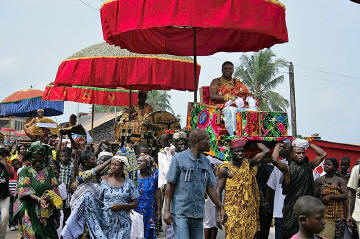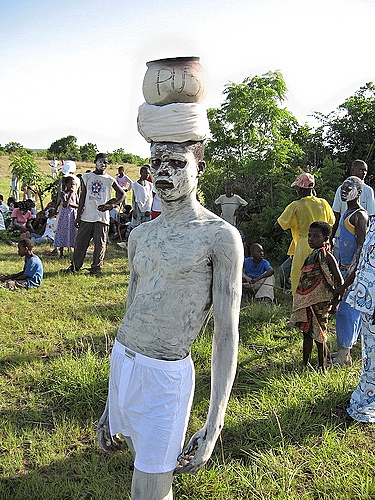Article
Ghana Festivals
|
A popular feature and
probably somewhat large part of Ghanaian life is tied up with the many festivals
which are held all over the country throughout the whole year. For the most part
they are joyous colourful social affairs when the locals dress up in their
traditional costumes and meet together to celebrate or commemorate. Barely a
week goes by without one or other town or village holdings its major annual
celebration, while everyday personal events such as
funerals, name-giving ceremonies and weddings tend also to be taking place with something
of a carnival atmosphere.
name-giving ceremonies and weddings tend also to be taking place with something
of a carnival atmosphere.
Festivals in Ghana occur throughout
the whole year and are used as a
means to remember their ancestors and to be protected and favoured by them, but
they are also held to purify the area and allow its people to go into the new
year with hope and vision. They are a year round affair with different regions, ethnic
groups and tribes having different celebrations. These rituals and celebrations
are an important part of daily life and this can be easily seen by the large
gatherings that are seen at festivals, marriages and funerals.
|

Bakatue Festival, Elmina
 Steven Belcher
Steven Belcher

Click on Image to see larger
version |
| There are over two hundred festivals
celebrated each year. Some of the more important of perhaps
around 100 local festivals have become special tourism events. Many are
annual affairs where people get together to celebrate or commemorate,
however some groups have a number of these that take place throughout the
year. An example of an annual festival is the
Aboakyer Festival which is
celebrated each year on the first Saturday in May by the people of Simpa or
Winneba in the Central Region of Ghana. It is a celebration to mark
the migration of these people from the ancient Western Sudan Empire where
they were led by 2 brothers and a god called Otu. Upon consulting their god,
they were instructed by their traditional priest or mediator between the
people and the god to sacrifice a young member of the Royal family every
year to their god.
This was not good news so they made an
appeal to their god who asked for an animal from the wild cat family to be
caught alive and beheaded before the god. Initially the wild cat chosen was
a Leopard, however later this was considered too dangerous to catch a live
leopard, many men were lost before capturing it alive. A second appeal when
to the gods and he decided to accept a mature bush buck (like a deer)
instead.
A hunting expedition by two Asafo groups compete to catch live antelope in a
nearby game reserve. The first group
to present its catch to the Chief at a colourful durbar is declared the winner and is
highly regarded for bravery. A durbar and procession of the chiefs and warrior
groups in colourful regalia together with brass bands, dancing, performances
of folklore and parties takes place as a part of the celebration. |

 Aboakyer Festival in Winneba
Aboakyer Festival in Winneba

Click on Image to see larger
version |
Some festivals are more regular like that
of the Ashanti people in and around Kumasi where one of their festivals
takes place every 40th day. The
Adae and Akwasidae
Festival (festival of Purifying of the
Ashantis’ ancestral stools), is also referred to as the
Festival of the Asante (Ashanti). Celebrated every 40th day (once every 6
weeks), by the Ashantis. The Ashantis believe in the dead and when a king
dies his stool (chair) is sent to a special place where it is kept. During
this festival the Kings of Asante worship their
ancestral stools and skeletons of the past Kings preserved at the Bantama
mausoleum. The festival can take place on any day of the week and 40 days after
the previous Adae, however when it falls on a Sunday it is known as the Akwasidae
Festival. It is a public affair and the King sits in state at a big durbar
and anyone can shake hands with the King. All the chiefs and traditional
people of Ashanti also come to pay homage. This is preceded with the Ashanti
King, riding in a palanquin, adorned with all his gold ornaments. Outside
the Royal Palace in Kumasi he watches a colourful procession with coloured
canopies and umbrellas, drummers, dancers, horn-blowers and praise singers.
One such date when a Akwasidae will take place in 2009 is Sunday 4th
October.
And then there are some that take place
only every couple of years like the Panafest. This is a cultural event
dedicated to the ideals of Pan-Africanism and the development of the African
continent. It is organised for Africans and people of African descent and
its goals are to establish the truth about the history of Africa and the
experience of the African people, using African arts and culture to show
this. It consists of performances and workshops in theatre, African dance,
drama, music, cinema, poetry, colloquia and lectures. A sample of they types
of activities which take place during one of these events includes the Grand
Durbar of Chiefs in full costume, Rites of Passage programs, Slave March
re-enactment, midnight candlelight vigils at Cape Coast Castle, and tours
are available to various places of interest such as slave castle dungeons.
It is held in the historical towns of Cape Coast and Elmina. Celebrated every 2 years in August, the next being in 2009.
We have compiled a list of those we have
been able to identify and can be seen in our reference section under
Diary of Festivals.

|